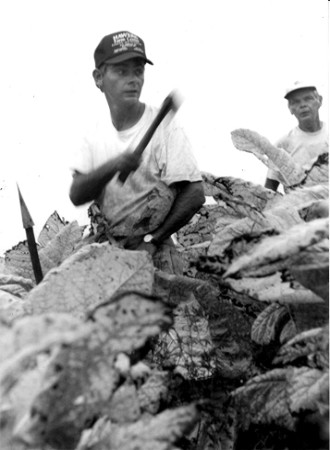
Tobacco Blues 1998
Distributed by Filmakers Library, 124 East 40th street, New York, N.Y. 10016; 212-808-4980
Produced by Café Sisters Productions
Directed by Christine Fugate
VHS, color, 58 min.
High School - Adult
Health Sciences, Economics, Agriculture
Date Entered: 11/09/2018
Reviewed by Rebecca Adler, College of Staten Island, City University of New YorkThe not-so-new-anymore breed of documentary film that clocks in at just under an hour is clearly a made-for-television product whose topicality may or may not consign it to a limited lifetime. Greater longevity comes only from some more resonant content or aesthetic dimension. Tobacco Blues is clearly inspired by the adverse consequences to the individual small tobacco farmer of the ongoing efforts of the Food and Drug Administration, or FDA, to have tobacco labeled as a drug -- and therefore be able to regulate every aspect of its production and sales. But the film succeeds in having a life beyond its immediate newsworthiness by humanly acquainting us with four Kentucky tobacco farmers and their families, whose way of life going back many generations is threatened by the near universal assault on the "dirty weed" (as a centuries-old piece of doggerel has it).
The farmers appear here as victims caught in a crossfire of politics, health matters, and big business, with no one to look after their interests. Cultivating small parcels of land, hugely dependent on the large tobacco companies that buy their crops, the farmers, while aware that their product may be harmful, nonetheless find themselves trying to hold on to a way of life that seems tied to the earth itself. The film does not in any way try to soften the mendacities of the CEO's who for the longest time insisted that smoking engendered no ill effects whatsoever. Nonetheless, tradition passed on generation after generation dies hard, even as one of the farmers begins to experiment with a harvest of organic vegetables. But meeting these farmers and their families, and observing something of their cyclic routine (including the customary ululating of the tobacco auctioneer), makes us look at their world as one would look upon that of any endangered species, even a malignant one -- and our enduring sympathies, despite all, are enlisted. Recommended.